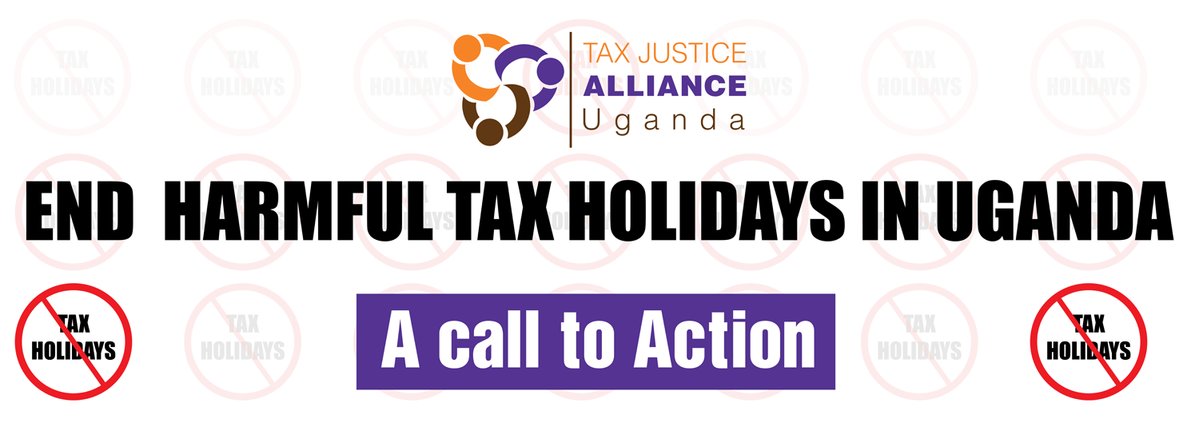On May 29th, the Tax Justice Alliance in Uganda, a loose coalition of civil society and individuals, called upon the Government and other key stakeholders to End Harmful Tax Holidays in Uganda.
“Our concerns, the Alliance states, revolve around the presence of harmful tax holidays; foregone tax revenues as a result of the holidays/incentives; the discretionary powers accorded to the line minister to award tax incentives, exemptions and holidays; the lack of access or public disclosure of information on the incentives, exemptions and holidays awarded to corporations and individuals; and also the failure to routinely review the impact or benefits that are accruing from the respective incentive, exemptions and holidays. It must be noted that tax incentives/holiday/exemptions equal to tax foregone that ultimately has to be paid by someone else; in this case it is the citizens that bear that cost”.
The national alliance gathers SEATINI Uganda, Oxfam in Uganda, Civil Society Budget Advocacy Group (CSBAG), Uganda Debt Network(UDN), Action Aid Uganda (AAIU), Citizens Watch-Information Technology (CEW-IT), Women and Girl Child Development Association (WEGCDA), Water Governance Institute (WGI), Africa Freedom of Information Centre (AFIC), Inter University Tax Justice Forum (IUTJF) and Initiative for Social and Economic Rights (ISER). Together, they held a press conference at SEATINI Uganda offices in Kampala to present concerns, observations and recommendations in respect to tax holidays in Uganda.
“The Tax Justice Alliance recognises that Foreign Direct Investment (FDI) is critical in fostering economic growth and development, they said. There is awareness that tax incentives such a tax holidays and exemptions can promote investments in the country if they are transparent and equitably accessed, awarded and managed. It’s also a fact that tax incentives when mismanaged can distort internal market dynamics and bleed corruption.
However, an analysis conducted by the Tax Justice Alliance suggests that developing countries do not need to grant tax incentives, exemptions and/or holidays to attract Foreign Direct Investment (FDI), because the decision to invest by genuine multinational corporations is largely based on other parameters such as cost of labour and energy; presence of adequate infrastructure; and the country’s overall investment climate. This has also been confirmed numerous times by IMF and the World Bank, which state that countries that are most successful in attracting foreign investors did not have to offer tax holidays, but rather invested in other important factors such as good quality infrastructure, low administrative costs of setting up and running businesses, political stability and predictable macro-economic policy that will encourage growth and expansion of indigenous investments. The same questions abound whether it is relevant and critical to offer tax holidays to attract FDI”.
You can read their press statement here, which includes a list of institutions and individuals benefiting from tax holiday in the country, and civil society’s recommendations regarding the issue:
- “Parliament, with the assistance of the Auditor General, needs to conduct routine cost-benefit and opportunity-cost analyses of all tax exemption, incentives and holidays that have so far been awarded and the subsequent ones to justify their continued existence.
- Review the investment regime to allow more scrutiny and due diligence of investors by Uganda Investment Authority.
- The Government should establish a multi-stakeholder monitoring panel including policy makers and civil society to evaluate the relevance of awarded tax incentives, exemptions and holidays that reports to parliament.
- The Government should put in place transparent processes and procedures for managing and granting tax exemptions. This will promote transparency and deter political patronage”.
The Alliance also took an advocacy opportunity, using a practical example in the country, as MPs were voting a proposal by President Museveni to offer a 15-year corporation tax waiver for Bujagali Energy Limited (BEL), a 250-megawatt power-generating facility. On the same day as the press conference, the MPs rejected the 15 years but endorsed a five-year waiver on corporation tax levied on the company’s profits, as the Tax Justice Alliance was advising. You can read a comprehensive article about this vote here.
For more information, please get in touch with Nelly Busingye Mugisha, Programme Officer “Financing for Development/Tax Justice” at SEATINI-Uganda.
